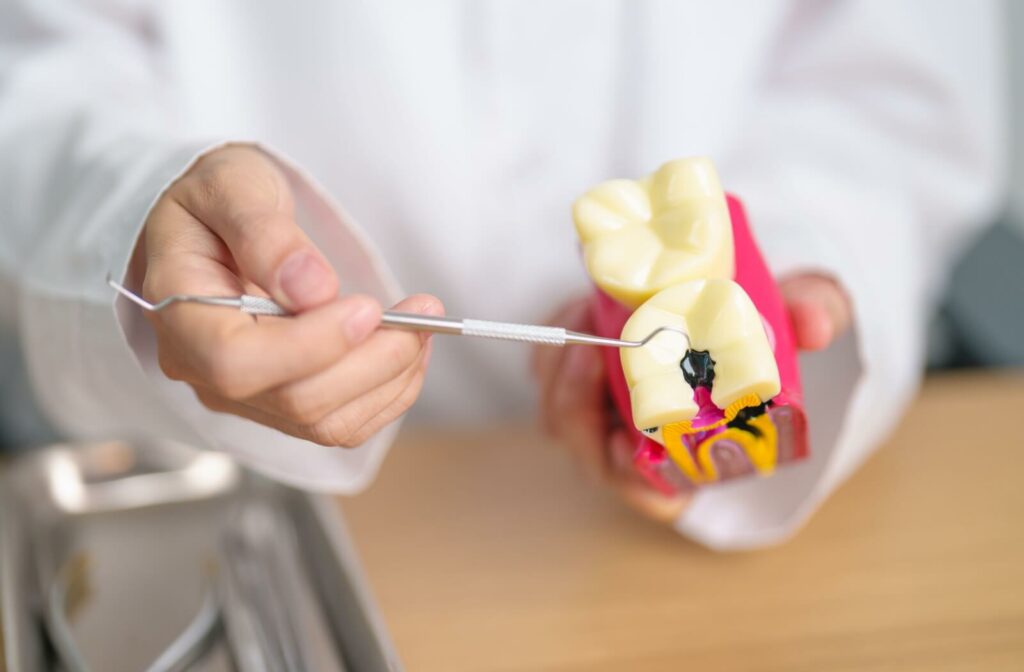Yes, cavities can cause bad breath. When a cavity forms, bacteria accumulate in the decayed area of the tooth, producing unpleasant odours. If left untreated, this build-up can lead to chronic bad breath (halitosis). Cavities also create pockets where food debris can get trapped, providing even more fuel for bacteria.
Combined with poor oral hygiene, untreated cavities may result in more significant dental problems like infections, making it even harder to maintain fresh breath.
Understanding Cavities
Cavities, also called dental caries, are holes in the enamel caused by acid-producing bacteria. These bacteria thrive on sugars from food and drinks, which they turn into acids that slowly wear away at the protective enamel of your teeth. Once the enamel weakens, decay can progress deeper into the tooth, causing pain, sensitivity, and—yes—bad breath.
Regular dental check-ups are your best defence here, as cavities often start without apparent symptoms. Many people don’t realize they have a cavity until it causes discomfort or becomes visible. By then, the bacteria inside the cavity might have already contributed to unpleasant breath. Fortunately, with regular check-ups, early detection is possible, giving you the reassurance that you’re being proactive in your oral health.
Remember, cavities are preventable and manageable if caught early. By adopting good oral hygiene practices, like brushing twice daily, flossing, and routine dental visits, you can stop cavities from developing and spreading. This knowledge empowers you to take control of your oral health and prevent unpleasant breath.
Treating Cavities
The treatment for a cavity depends on its size and how far the decay has progressed. For early-stage cavities, fluoride treatments can often help repair the enamel before a full-blown cavity forms. Your dentist may recommend fluoride varnish or high-fluoride toothpaste for additional protection.
When decay has penetrated through the enamel, the most common treatment is a dental filling. The dentist will remove the decayed portion of the tooth and fill the cavity with materials like composite resin, amalgam, or porcelain. The filling restores the tooth’s shape and prevents further decay. Fillings can usually be completed in a single visit, making them a quick and efficient solution.
A crown may be necessary for larger cavities that have weakened the tooth. A crown is a custom-made cap that covers the entire tooth, providing extra strength and protection. Crowns are often recommended when the tooth’s structure has been significantly compromised by decay.
If decay reaches the inner pulp of the tooth, a root canal may be required to save it. Root canal therapy involves removing the infected tissue inside the tooth and sealing it to prevent further infection. While root canals can seem intimidating, modern techniques make them relatively painless, and they’re a vital treatment option for severely damaged teeth.
Extraction may be necessary in extreme cases where the tooth can’t be saved. Although this is a last resort, your dentist will provide options for replacement, such as implants or bridges, to restore function and appearance.
Regardless of the treatment, the goal is to remove decay, eliminate bacteria, and restore the tooth to a healthy state. Addressing cavities promptly prevents pain and further damage and helps improve your breath.

Signs & Symptoms of Cavities
- Tooth sensitivity: Discomfort when eating hot, cold, or sweet foods.
- Visible holes or pits: Cavities may appear as dark spots or holes on the teeth.
- Toothache: Persistent pain, especially when biting or chewing.
- Bad breath: Bacteria in decayed teeth can produce unpleasant odours.
- Swelling or redness: Infected cavities can cause gum inflammation.
- Dark stains: Teeth may show brown, black, or white stains from decay.
Preventing Cavities
Preventing cavities starts with maintaining a consistent oral hygiene routine. Brushing your teeth twice a day with fluoride toothpaste is essential, as it helps remove plaque and prevents bacteria from sticking to your teeth. Flossing daily is just as important since it removes food particles and plaque between the teeth—where your toothbrush can’t reach.
Remember, your diet plays a crucial role in cavity prevention. By limiting sugary snacks and drinks, you’re reducing the risk of enamel erosion. Instead, opt for water, cheese, nuts, and vegetables, which promote saliva production, and are not acidic. This mindful approach to your diet is a responsible step towards maintaining good oral health and preventing bad breath.
Regular dental check-ups are essential for cavity prevention. During these visits, your dentist will clean your teeth, check for early signs of decay, and apply fluoride treatments if necessary. These appointments also allow you to discuss changes in your oral health and address concerns about bad breath.
Habits for Healthy Gums & Teeth at Home
Maintaining oral health doesn’t have to be a chore. Small daily habits can make a big difference in preventing cavities and promoting fresh breath. Start by making brushing and flossing fun for children. Let them pick out a toothbrush with their favourite character or play a two-minute song while they brush to keep them engaged.
Using an electric toothbrush can enhance your brushing routine by removing more plaque for adults. Many electric toothbrushes come with built-in timers, helping you brush for two minutes.
Incorporating mouthwash into your routine can also improve your breath and reduce plaque. Choose a fluoride mouthwash to strengthen enamel and protect against cavities. Mouthwash is beneficial after meals if brushing isn’t immediately possible.
It’s also helpful to monitor your breath throughout the day. If you notice persistent bad breath, it could indicate an untreated cavity or another oral health issue. Stay hydrated, chew sugar-free gum, and visit your dentist regularly to keep your mouth healthy and odour-free.
Schedule Your Next Dentist Appointment Today
Don’t let cavities or bad breath take the joy out of your smile! Whether you need a routine check-up or treatment for a cavity, we’re here to help. Marks Dentistry is committed to providing comprehensive dental care for every family member.
Contact us today to book your next appointment and enjoy fresher breath and healthier teeth!




